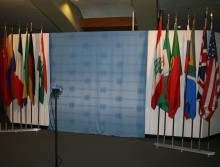 The past few weeks has seen the Middle East face a whole host of tragic issues: rioting and even gun violence in Egypt, the further use of violence against civilians in Syria, the outrageous hate speech from Hamas against Israel and a mysterious explosion in Lebanon that reminded us of the illegal Hezbollah weapons there.
The past few weeks has seen the Middle East face a whole host of tragic issues: rioting and even gun violence in Egypt, the further use of violence against civilians in Syria, the outrageous hate speech from Hamas against Israel and a mysterious explosion in Lebanon that reminded us of the illegal Hezbollah weapons there.
But last week, the major headline-grabber from the UN Security Council meeting on the region was the condemnation of Israel by European nations for building apartments. Israeli Ambassador to the UN Ron Proser slammed the absurd Israel-centric focus in the midst of regional chaos, and rightly so. It’s a symptom of self-righteous laziness on a global scale, and it’s costing lives.
What else can be said when Europe slams Israel for building homes on territory it will keep even in a deal with the Palestinians, while Palestinian refugees have been blown apart by Syrian jets? True, that issue garnered attention, but should it not be the primary focus? Or perhaps any of the other traumatic issues in the region. But no, it’s Israel. And I believe it’s due in part to national procrastination.
In essence, the Syrian conflict, the Egypt political strife, the Iranian nuclear dispute and Hezbollah and Hamas terrorism are all difficult issues to solve. They require taking risks, speaking out in what may prove unpopular ways and an intense level of focus and energy. Bashing Israel, however, is easy.
Firstly, Israel is an ally for the West and they won’t respond much beyond verbal protest and defiance. The West risks little or nothing. It’s not like Israelis will storm European embassies, as was done in other Middle Eastern countries for perceived offenses, or attack US personnel as was done in Lebanon, Iraq and most recently Libya. No, Israel is a peaceful friend, not an unpredictable question-mark.
Furthermore, when it’s politically correct, bashing Israel even scores political points at home, especially in a Europe that is becoming increasingly anti-Israel and even anti-Semitic at times. So why tackle serious issues such as Syria firing Scuds at its people when a politician can look like they care about real issues by attacking the construction of a new apartment? Procrastination never looked so good—especially when it’s at its worst.
The Bible identifies two troubling causes of procrastination—laziness and rebellion. The latter sounds like it was being addressed to the nations of today in Psalm 2. The Psalmist questions why the nations seek to overthrow G-d’s authority and boast of possessing such power, while G-d merely laughs at the absurd notions. The Psalmist ends with urging the nations to adhere to G-d’s rule now while there’s still time. It’s a plea not to procrastinate.
Meanwhile, in Proverbs, the lazy man is portrayed as claiming crazy things prevent them from doing what they should. “There’s a lion out there,” is the most laughable excuse.
The reality is that procrastination stems from difficult things that we don’t want to do. We end up finding ridiculous or even wicked things to do just so we can avoid doing what we must. It may be antipathy due to our own moral decline or perhaps just a lazy lack of desire to tackle a challenge.
How does this apply to the world? Again, the West is plagued with an immoral disinterest in standing for what’s right all too often. How many times must we say, “Never again”? So rebellion plays a subtle, if not subconscious, role in ignoring the world’s problems and focusing on Israel. It also stems from a natural aversion to the People of G-d that plagues an unrighteous world. We all must battle that.
Perhaps the most obvious cause though is laziness. Our slothful sides ask us, “Why do what’s hard when wasting time is easy?”
A friend of mine recently noted that he finds himself less productive when he has that challenging task ahead of him. So he intentionally tackles the most difficult project at work first, so that way his entire day is more effective. It’s compensation for our natural procrastination.
Obviously not every stringent task can be completed first. But the principal should guide us. Knowing that we cringe at challenge, that we shy away from seriousness, that we pause before perseverance, we need to intentionally and aggressively engage life’s less appealing tasks.
If the United Nations had done that, instead of focusing on the “easy target” of Israel—which is unfairly targeted at that—then maybe the Middle East’s tragedies would be the ones making headlines, not another “never again” speech.
(By Joshua Spurlock, www.themideastupdate.com, December 23, 2012)
